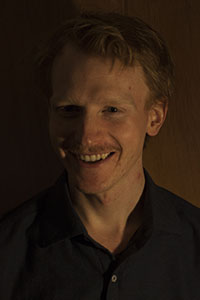The Symphony Within the Story:
Liam Workman in Conversation
with Brock Zawila

Malahat volunteer Liam Workman talks in person with Brock Zawila about "The Lake Blouin Symphony: A Listening Guide," his fiction piece on the stories that music tells, set to be published in Issue #200.
The Malahat Review's upcoming Issue #200 is our fiftieth anniversary issue. It features Victoria writers past, present, and future. Be sure to check out the Issue #200 page for a complete list of contributors.
The first thing that stood out to me in your story was the FLQ (Front de libération du Québec) elements that you worked in, and kept coming back to throughout the story, and how you fit them into the larger Québec setting as a whole. Was the story always set in Québec in that time period?
Yes it was. Whenever I don't know what to write about, I dive into something I know nothing about, or almost nothing about. I didn't know anything about rural Québec, and you look at a Canadian map and it seems like blank space other than Montreal, and maybe some other spots, and it was a place I wanted to explore, and this seemed like a good time period to explore it in. So I think that's why I ended up going with the FLQ crisis. I also started writing it back in 2014/2015, and it felt particularly relevant at the time because it is such a strange part of Canadian history where domestic terrorism was a real threat for probably seven or eight months and probably historically over the next decade or two. So, it seemed relevant to the current contemporary situation.
I remember learning about the FLQ in high school and I was surprised it wasn't until I was 15 that I heard about them. You would think it would be more out there.
Yeah, sometimes those things aren't talked about because it's part of the healing process for the people that experienced it and went through it. Maybe it’s also because it was a turning point for North America in particular because terrorist tactics were being used in our own country, which was probably a very new concept.
Was it rural Québec in general, or the separatist feelings of the time that first interested you?
I'd say they went hand in hand? I was probably more interested in the setting of Val-d’Or, but I just say that based on the pictures. It's a beautiful place, and because of my own provincial centralism I haven’t seen a lot of the country and I wanted to know more about it. I also didn't want to get lost in a story that I didn't know anything about, a place I didn't know anything about. So I think I placed it in that time period to help flesh out a larger story.
If you started with the Québec portion of the story, or the Québec angle, when did the music or the symphonic part make its way into the story?
Now, here's the thing. I originally had the idea to write a story whose visual elements were second stage to the auditory elements. It was a concept that I had been working on for a while, and thinking about for a long time, and I had been listening to a lot of symphonic music when I started, and I realized that, you know, not only does this kind of music tell a story within it with different movements and the different instruments, but there are also conflicts that are resolved, like in a story. To that point, I had never read a story that adapted symphonic music to a written story. I wanted to do that, I wanted to try and adapt sound to story.
Are there any parts of the story that you're really proud of where you tie the music together with the plot?
Yes, I'd say there is a rhythm to the opening scene that I had in my mind while I was doing it. A decent comparison is, have you seen Baby Driver?
No, I haven't.
Well, the opening scene in that movie is edited very well because it adds the rhythm of the music to the character’s actions very effectively. It’s not quite the same in the opening of the story, but there are cues in it, with the way that Peter’s mom lights her match on her jeans or tosses it to the ground. Those cues are something that I tried to bring into the story, and I found to be one of the more difficult things about transcribing sound to a story.
Yeah, well, you're taking a medium that's dictated by time and putting it into a timeless medium. But the cues you put in were like a rhythm, like a bass line to the story.
It guides a lot of the action in those first two opening scenes after the introduction.
I think that's why I put the introduction in there, and the first fourteen bars of silence. I think they prompt the reader, I want them to prompt the reader to hear what comes, read and... I don't know if there's a word for that. But, the experience of hearing what you read, I guess, so you read a gunshot and you hear a gunshot at the same time, to cue the reader for reading listening experience.
With music being such an integral part of the story, and talking about the rhythm to the story, are there any particular songs or symphonies that you listened to while writing?
Peter’s symphony can be loosely connected to a production by a French Canadian man named Claude Champagne, "Symphonie gaspésienne." I picked it because I knew that I wouldn't be able to write based on what I think a symphony would sound like, and if I did I would have to try and write around my own lack of knowledge. So I did transcribe music that felt relevant to the setting. And, of course, Claude Champagne’s symphony is referenced later in the story. I also found myself putting in hints of Mozart and Beethoven, I think because those turn of the century composers had a very strong grasp of conflict in their music. Especially what Mozart does in his requiem, his last piece of music from on his deathbed. It's very emotional and powerful because you can hear the story that’s playing throughout.
Do you think if someone put on “Symphonie gaspésienne,” and read your story, it would match up pretty well?
Absolutely.
How long is the symphony?
It’s around eleven minutes, so it probably wouldn't last you the full writing experience, but I think it syncs up very well to the opening, probably the first half of the story. I think it's partly because whenever I was writing or editing the story, I would start the song and then start writing or editing at the part where the story matched up. It was, I guess, both a conscious and a bit unconscious of a decision, because I would be making edits and then if I had to stop or think about something I'd pause the song naturally. I would encourage readers to at least try it, and see if it works for them like it did for me.
Have you ever done anything like listening to the symphony while working on any other stories, or do you have any other processes? I remember reading one time, I don't remember who the author was, but they had installed bike pedals under their desk so that whenever they wrote they biked, and it was just enough to turn off their consciousness a little bit and get into their subconscious.
Maybe there are some processes that find their way into the specific story I'm writing, but unfortunately I don't really have a writing process.
Do you normally listen to music while you write and edit?
Yeah for a variety of reasons but mostly because I get distracted by passing conversations or whoever's sitting next to me or anything else. I wouldn't say I need music or I can't write without it, but I think it's a decision I make because I'm easily distracted and depending on what I'm listening to I can write fairly effectively.
Was composing, the act of Peter composing, or Peter and Gehrman's teaching ever a bigger part of the story? Did you ever have anything like that in there, or was it kind of always just the relationship between the two at the forefront? Was it ever more about Peter becoming an artist?
No. When I would originally look back at this piece and I would go back to the editing process again and again, I would see that piece missing, and my initial reaction was that you noticed it because there was a lack of conflict or the story was too flat, that something’s missing. I would take the story through the editing process and add it in here or there and then take it away ultimately because, I don't know, I just feel that how the fragmented memory of the story works, is that there's a bit of realism in the retelling of the story and that there are a lot of blank spots.
I think the editing process for this story was an acceptance that this story had to be the way it was, it had to feel a little bit like there was a missing piece of it, and I think it was most effective when there was that hole.
So this is coming out in the Malahat's 200th issue, which is featuring local Victoria authors. Would you say there's anything Victorian about your story?
No, I can't really say, it's very difficult because you know, it's in a different province, French Canadian culture is very different. Victoria's very hilly, and windy, and if you listen to “Symphonie gaspésienne,” the opening, it crawls, it feels like a swamp, it's like a pulsating string section. Whenever I looked at pictures of rural Québec, it made sense because it feels very slow and pulsing and there's something beneath the surface.
Yeah like you mentioned at the beginning, the Canadian Shield, I feel it's underneath everything that comes from eastern Canada, from central Canada, right? That entirely different landscape, and it is one of those things where you don't realize how influential it is, or how big a part of it is, until you go somewhere where they don't have that.
I was telling someone the other day that I'm kind of a terrible Canadian because I've never been to another province, I'm very B.C.-centric, I think as a result.
Well, I mean, what makes a good Canadian?
I guess you need to know your country a little bit, right?
Finally, my last question: In your head is the accordion solo happy or sad?
Oh, I can't remember what I based it off of. I remember when I wrote it I found this very interesting accordion solo, that I very much loved, but I couldn't remember it for the life of me at this point. It was that sort of eastern Canadian pastiche that I felt was sort of appropriate to this portion of the story. I think I wanted an accordion solo because it's such a strange instrument.
It's a beautiful instrument.
It's both hated and loved in the same breath, and it's a very Canadian instrument in some ways, but I think it was an example of how Peter allows for so much variety within this thing he calls his own.
So it's neither sad nor happy, it depends upon the interpretation of the composer?
I think it starts happy and then ends sad?
Like every story in the world.
The ones that are always remembered.
The ones that are worth remembering.
Not the ones that are worth remembering, the ones that are remembered.

Liam Workman
* * * * * * * *









